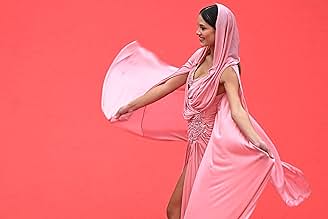IMDb RATING
7.7/10
18K
YOUR RATING
A young teacher hopes to be transferred to Istanbul after four years of mandatory service in a remote village, but is accused of inappropriate contact by two students. After losing hope, a c... Read allA young teacher hopes to be transferred to Istanbul after four years of mandatory service in a remote village, but is accused of inappropriate contact by two students. After losing hope, a colleague offers him new perspectives on life.A young teacher hopes to be transferred to Istanbul after four years of mandatory service in a remote village, but is accused of inappropriate contact by two students. After losing hope, a colleague offers him new perspectives on life.
- Director
- Writers
- Stars
- Awards
- 15 wins & 10 nominations total
- Director
- Writers
- All cast & crew
- Production, box office & more at IMDbPro
Featured reviews
While watching the movie "About Dry Grasses," I didn't realize how quickly the 3 hours and 17 minutes passed. Nuri Bilge Ceylan's films seem to peel off humans layer by layer. They present the weakest, darkest aspects of humanity to the audience. While watching the movie and after it, you find yourself in a confrontation with yourself. The situation is the same in this film. The lead actors, Deniz Celiloglu (Samet), Merve Dizdar (Nuray), and Musab Ekici (Kenan) deliver a wonderful performance. Indeed, Merve Dizdar won the award for best actress at Cannes for this film.
The film revolves around a teacher, Samet, whose career is endangered by a sexual abuse accusation from his student, Sevim. Samet, portrayed by Deniz Celiloglu, is a complex character who is bored with his life and longs for a posting to Istanbul. His interactions with his fellow teacher Kenan and a woman named Nuray play a significant role in exploring themes of friendship, competition, and disillusionment. The characters are depicted with a high degree of complexity, adding depth to the overall narrative and theme of the film. The long duration of the film allows for an in-depth exploration of the characters, making it a reflective journey among the complexities of human relationships and moral dilemmas.
"About Dry Grasses" is a thought-provoking and absorbing drama that delves into the depths of the human soul, exploring the moral complexities and multifaceted nature of human relationships. Nuri Bilge Ceylan's distinctive directing style and the impressive performances of the cast create a cinematic masterpiece that is enlightening both visually and intellectually. The comprehensive and detailed narration of the film, combined with its literary quality, makes it a must-watch for lovers of auteur cinema.
The film revolves around a teacher, Samet, whose career is endangered by a sexual abuse accusation from his student, Sevim. Samet, portrayed by Deniz Celiloglu, is a complex character who is bored with his life and longs for a posting to Istanbul. His interactions with his fellow teacher Kenan and a woman named Nuray play a significant role in exploring themes of friendship, competition, and disillusionment. The characters are depicted with a high degree of complexity, adding depth to the overall narrative and theme of the film. The long duration of the film allows for an in-depth exploration of the characters, making it a reflective journey among the complexities of human relationships and moral dilemmas.
"About Dry Grasses" is a thought-provoking and absorbing drama that delves into the depths of the human soul, exploring the moral complexities and multifaceted nature of human relationships. Nuri Bilge Ceylan's distinctive directing style and the impressive performances of the cast create a cinematic masterpiece that is enlightening both visually and intellectually. The comprehensive and detailed narration of the film, combined with its literary quality, makes it a must-watch for lovers of auteur cinema.
A 3.5 hour visual feast. Like Nuri Bilge Ceylan's previous films, this film, although quite long, contains plenty of dialogue that is not boring. Although the action part takes place in the countryside, there are visually fairy-tale environments. However, life is not easy at all in this deserted geography of Anatolia. The film greets the audience with snowy landscapes. In the beginning, we follow teacher Samet. Samet proceeds on the road surrounded by a white and endless horizon in the snow. This powerful scene provides clear clues about the film.
From the first moments of the film, director NBC establishes a fascinating and desolate atmosphere. It repeatedly tells us (as in the movie Winter Sleep) that loneliness is not only a result of external conditions, but also the result of our own emotional moves and selfish attitudes. Master cinematographer Gökhan Tiryaki did not take part in this movie, but the movie is still very successful. Cold colors and gray tones convey the isolation and depression of the characters in a balanced way. It allows us to feel the coldness on the characters' faces and the warmth of a glass of tea.
The deep scenario forces you to consider fundamental issues of the human condition in the context of good and evil, individualism and collectivism. NBC shows us that these dilemmas exist in all societies and force us to question our own beliefs and behaviors.
Again a Masterpiece!
(But USA's Oscars and the Golden Globe will again ignore the master director.)
From the first moments of the film, director NBC establishes a fascinating and desolate atmosphere. It repeatedly tells us (as in the movie Winter Sleep) that loneliness is not only a result of external conditions, but also the result of our own emotional moves and selfish attitudes. Master cinematographer Gökhan Tiryaki did not take part in this movie, but the movie is still very successful. Cold colors and gray tones convey the isolation and depression of the characters in a balanced way. It allows us to feel the coldness on the characters' faces and the warmth of a glass of tea.
The deep scenario forces you to consider fundamental issues of the human condition in the context of good and evil, individualism and collectivism. NBC shows us that these dilemmas exist in all societies and force us to question our own beliefs and behaviors.
Again a Masterpiece!
(But USA's Oscars and the Golden Globe will again ignore the master director.)
Probably Nuri Bilge Ceylan's movie with the most dialog. If you don't mind spending three and a half hours sitting, you will watch it with interest. The acting is incredibly successful. Deniz Cellioglu's acting as Samet is incredible. Merve Dizdar had already proven her success by winning the best actress award at the Cannes film festival for her acting in this movie. Centering on a handful of teachers in a snow-covered village in Anatolia, we watch an extraordinary story with a great script. Although the prolonged dialogues sometimes slow down the pace, I think you will enjoy the film in general. Especially the naturalness of the small actors in the student roles is magnificent. During Nuray and Samet's long conversation at the dinner table, there are inconsistencies in terms of continuity in the positions of the actors at different camera angles. Ceylan is already a master photographer. He reflected this mastery in his movie. I found his use of the camera very successful, especially in tight spaces. Some of the sentences interspersed between the dialogues still impress me. It will be very surprising if this movie is not among the best foreign film nominees for the Oscars. It was one of the two movies I saw this year that I can say I liked very much. I hope the majority feel the same way.
While I'm not accustomed to writing reviews, I feel compelled to share my thoughts on this film. The experience leaves me with mixed emotions. Visually, it's undeniably stunning, but the narrative's prolonged nature leaves a somewhat unpleasant aftertaste. With a runtime of 3 hours, the first two are rather tedious, contrasting sharply with the spectacular final hour. This is perhaps the most disappointing thing about the movie because it's well seen that this has potential. The final hour stands out as one of the best cinematic experiences I've had, but it's the initial two hours that fail to captivate. The slow pace, extended duration, and occasional loss of coherence contribute to my reservations.
Regarding the characters, the protagonist is remarkably selfish, self-centered, and outright unpleasant to others. While I appreciate the appeal of characters challenging viewers' perspectives, personally, I struggle to enjoy a narrative with such a malevolent main character. This character type represents the one I find most detestable.
In terms of character impact, none, except for the woman, left a significant impression on me. She undeniably stands out as the most intriguing character in the entire movie. The final scene, where she confronts her friend, emerges as one of the most impactful moments in the film.
Despite being a polarizing film that either garners love or disdain, I encourage individuals to give it a chance. Maybe not solely for the characters or the storyline, but there's a potential for valuable lessons to be gleaned from this cinematic endeavor.
Regarding the characters, the protagonist is remarkably selfish, self-centered, and outright unpleasant to others. While I appreciate the appeal of characters challenging viewers' perspectives, personally, I struggle to enjoy a narrative with such a malevolent main character. This character type represents the one I find most detestable.
In terms of character impact, none, except for the woman, left a significant impression on me. She undeniably stands out as the most intriguing character in the entire movie. The final scene, where she confronts her friend, emerges as one of the most impactful moments in the film.
Despite being a polarizing film that either garners love or disdain, I encourage individuals to give it a chance. Maybe not solely for the characters or the storyline, but there's a potential for valuable lessons to be gleaned from this cinematic endeavor.
Once again, N. B. Ceylan has presented a magnificent gift to his audience and all cinema-lovers.
Ceylan, successfully following some essential footsteps of his former movies "Winter Sleep" and "The Wild Peer Tree", portraits the crises of restricted lives of (dazzlingly perfomed) characters feeling stuck in a provincial region of Turkey. It is even possible to call these movies a trilogy on masculinity, conflicts of intellectual class, "banality of evil" (as Hannah Arendt calls) and anti-heroes stuck in provincial stability, seeking for so-called "a better life elsewhere."
Regarding the visual narration of the movie, it is obvious that Ceylan has embraced a number of innovation on designing the visual aspects of the story; moving cameras, short-cuts for dialogue scenes etc. Nevertheless, the movie also preserves the beauty of Ceylan's well-known photographic cinema language.
Still, "Onca Upon A Time in Anatolia", among the works of N. B. Ceylan, is a cinematic top to me. And surely it is an extemely high bar for not only Turkish cinema. In this context, it may be asserted that "About Dry Grasses" could have easily been called a masterpiece if it belonged to any other director.
Ceylan, successfully following some essential footsteps of his former movies "Winter Sleep" and "The Wild Peer Tree", portraits the crises of restricted lives of (dazzlingly perfomed) characters feeling stuck in a provincial region of Turkey. It is even possible to call these movies a trilogy on masculinity, conflicts of intellectual class, "banality of evil" (as Hannah Arendt calls) and anti-heroes stuck in provincial stability, seeking for so-called "a better life elsewhere."
Regarding the visual narration of the movie, it is obvious that Ceylan has embraced a number of innovation on designing the visual aspects of the story; moving cameras, short-cuts for dialogue scenes etc. Nevertheless, the movie also preserves the beauty of Ceylan's well-known photographic cinema language.
Still, "Onca Upon A Time in Anatolia", among the works of N. B. Ceylan, is a cinematic top to me. And surely it is an extemely high bar for not only Turkish cinema. In this context, it may be asserted that "About Dry Grasses" could have easily been called a masterpiece if it belonged to any other director.
Did you know
- How long is About Dry Grasses?Powered by Alexa
Details
- Release date
- Countries of origin
- Official sites
- Language
- Also known as
- On Barren Weeds
- Filming locations
- Nemrut, Adiyaman, Turkey(archeological site)
- Production companies
- See more company credits at IMDbPro
Box office
- Budget
- €3,500,000 (estimated)
- Gross US & Canada
- $118,955
- Opening weekend US & Canada
- $14,651
- Feb 25, 2024
- Gross worldwide
- $2,305,695
- Runtime3 hours 17 minutes
- Color
- Sound mix
- Aspect ratio
- 2.39 : 1
Contribute to this page
Suggest an edit or add missing content































